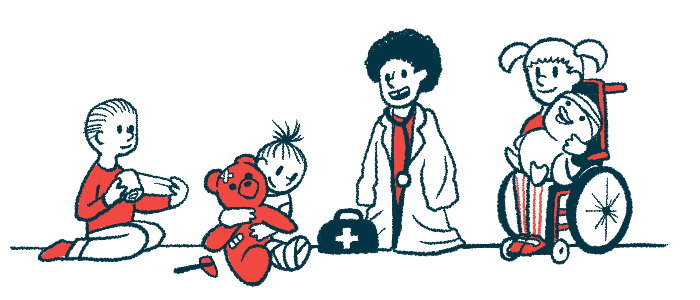Siblings of PWS patients require tailored support as they grow up
Study: Their shifting experiences, needs linked to variable parents’ perspectives
Written by |

The experiences of siblings of individuals with Prader-Willi Syndrome (PWS) change as they age, as do their support needs, and are associated with variable parents’ perspectives, according to a recent study.
Tailoring advice and support to the life stages of siblings, as well as involving them in discussions about the family’s needs, may have a positive impact on the lived experiences of families with PWS.
“A lifespan and family-focused view could help tailor support systems,” researchers wrote.
The study, “Experiences and Support Needs of Siblings of Individuals With Prader-Willi Syndrome- Findings From a Two-Stage Qualitative Study,” was published in the Journal of Applied Research in Intellectual Disabilities.
Siblings’ perspectives underrepresented in disability research
PWS is caused by a loss of genes located on the PWS locus, a region of chromosome 15, which leads to symptoms such as excessive hunger, intellectual disability, and behavioral problems.
“Siblings are frequently involved and even assume caring responsibilities in supporting the family member with a disability,” the researchers wrote. However, siblings’ perspectives are underrepresented in disability research, and “there is still a tendency to largely focus on parental perceptions to gather the siblings’ view.”
To gain a deeper understanding, a trio of researchers in the U.K. conducted a two-stage qualitative study involving 11 siblings and eight mothers of people with PWS. Only one sibling and one mother belonged to the same family unit.
Siblings either lived at home with their brother/sister with PWS or had left home. They were grouped into three age groups: 11 to 13 years (two siblings), 14 to 17 years (two siblings), and older than 17 (seven siblings).
I remember the tantrums and the stubbornness and the food stealing and the locked doors and the freezer.
The study’s first stage assessed the experiences of growing up and the family life of siblings of PWS patients, as well as parents’ perceptions of those experiences. Stage 2 evaluated siblings’ needs and parents’ perceptions of those needs.
At stage 1, five major themes emerged: family and relationships, food practices, shared understanding, adjustment and advocacy, and support needs.
A major point reported by all age groups was the lack of equitable treatment by parents. Parents acknowledged this, but said it was difficult to manage as they had to parent in different ways. Most siblings also spoke about strategies like avoidance or distraction to cope with navigating life around their brother or sister with PWS.
Family management of food was considered a problem by siblings due to the compulsive food actions of PWS patients. A sibling from the older group said, “I remember the tantrums and the stubbornness and the food stealing and the locked doors and the freezer.”
Sibling of the 14-17 age group reported feelings of guilt about eating food that their siblings with PWS could not. Older siblings stated they were familiar with feeling hungry and had trouble understanding they could eat whenever they wanted after moving out of their family home.
Siblings make effort to educate themselves about disease
Both siblings and parents reported being glad to share experiences with others in a similar situation, while siblings talked about their efforts to educate themselves on the disease and understand the behavior of their sibling with PWS.
“I remember like maybe a year ago … my sister had a really, really big tantrum … and something that my dad did is he showed me … this document … [that] talked about how to take care of them, but also handle them while they’re having tantrums … or just with day-to-day life,” a sibling in the 14-17 age group said. “Seeing that was incredibly helpful.”
Siblings reported that they undertook caring activities, while parents were concerned that their non-affected children could become primary caregivers when they got older. Some siblings also reported being advocates for their brother/sister with PWS by speaking at conferences for families or at their schools.
“I think it [would] be a benefit to know … what happens if someone has Prader Willi syndrome and …. how other people like relatives go through it,” a sibling of the younger group said.
All siblings shared a positive affinity for their brother/sister with PWS
All siblings shared a positive affinity for their brother/sister with PWS and the broader family, despite their daily life having extreme emotions depending on the behavior of the sibling with PWS. They also sought help for their mental health and well-being via schools, parents, psychotherapy, and counselling.
“Like older siblings, the parents also described feeling isolated,” the team wrote. “The parents expressed guilt and sadness about asking their child(ren) to adapt their behaviour to appease their brother/sister with [PWS].”
In stage 2, the older siblings group ranked the most critical support needs, which included providing more information for adult siblings about health concerns related to their siblings with PWS and more training and knowledge on the disease by healthcare and education professionals.
They also emphasized the importance of having more access to support groups and counseling therapists who have specialist knowledge of PWS, as well as knowing where to find information related to PWS research. Parents shared these needs but also highlighted the need for support with managing parenting practices.
“Findings reveal a potential developmental trajectory where the youngest group … is invested in advocacy, which shifts into adjustments in the adolescent years … and moves into sharing of experiences in later years,” the researchers wrote. “A family-centred approach in Prader-Willi syndrome might benefit from considering ‘family’ in broad terms, such as extended family members, especially in the case of younger siblings.”






